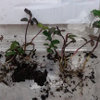Looking for some GMO answers
LaurieK123
12 years ago
Related Stories

Bean Bags: A Surprising Answer for Chic Comfort
Sink into a new generation of squishy, go-anywhere seating
Full Story
Easy Green: 6 Must-Answer Questions Before You Buy
Thinking about buying ecofriendly furniture? For a truly environmentally conscious home, ask yourself these questions first
Full Story
GREEN BUILDINGLet’s Clear Up Some Confusion About Solar Panels
Different panel types do different things. If you want solar energy for your home, get the basics here first
Full Story
HOUZZ TOURSHouzz Tour: A Boston Brownstone Is Restored to Glory and Then Some
Victorian-era architectural details create a strong base for an eclectic mix of furniture, accessories and modern art
Full Story
LIFEYou Said It: ‘Some Ask Why, Others Why Not?’ and Other Houzz Quotables
Design advice, inspiration and observations that struck a chord this week
Full Story
EXTERIORSCurb Appeal Feeling a Little Off? Some Questions to Consider
Color, scale, proportion, trim ... 14 things to think about if your exterior is bugging you
Full Story
DECORATING GUIDESDitch the Rules but Keep Some Tools
Be fearless, but follow some basic decorating strategies to achieve the best results
Full Story
KITCHEN DESIGNHow to Lose Some of Your Upper Kitchen Cabinets
Lovely views, display-worthy objects and dramatic backsplashes are just some of the reasons to consider getting out the sledgehammer
Full Story
DECORATING GUIDESFeel Free to Break Some Decorating Rules
Ditch the dogma about color, style and matching, and watch your rooms come alive
Full Story
PATIOSLandscape Paving 101: Some Reasons to Go for Granite
Thinking about a new patio or path? Invest in granite for its durability and low maintenance
Full StoryMore Discussions








colokid
LaurieK123Original Author
Related Professionals
Bellflower Landscape Architects & Landscape Designers · Palm Springs Landscape Architects & Landscape Designers · Port Royal Landscape Architects & Landscape Designers · South Orange Landscape Architects & Landscape Designers · Stamford Landscape Contractors · Severna Park Landscape Contractors · The Villages Landscape Contractors · Uxbridge Landscape Contractors · Livingston Carpenters · Loveland Carpenters · Snellville Carpenters · Valley Stream Carpenters · Falls Church Fence Contractors · Fremont Fence Contractors · Saginaw Fence ContractorsMindyw3
zen_man
samthomas
zen_man
nedweenie